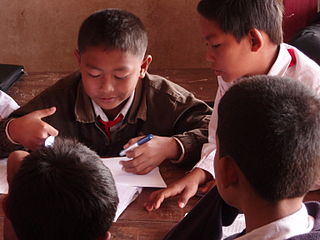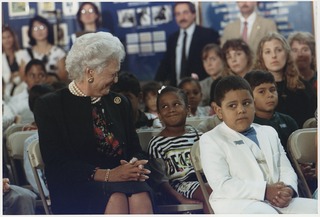The following outline is provided as an overview of and topical guide to education:
A Bachelor of Education (B.Ed.) is an undergraduate professional degree which prepares students for work as a teacher in schools. In some countries such as Tanzania and Kenya, additional tasks like field work and research are required in order for the student to be fully qualified to teach. It may also be accompanied with or followed by tests for licenses or certifications required for teachers in some areas.
Education in Iran is centralized and divided into K-12 education plus higher education. Elementary and secondary education is supervised by the Ministry of Education and higher education is under supervision of Ministry of Science, research and Technology and Ministry of Health and Medical Education. As of 2016, 86% of the Iranian adult population are literate. This rate increases to 97% among young adults without any gender discrepancy. By 2007, Iran had a student to workforce population ratio of 10.2%, standing among the countries with highest ratio in the world.
The Education Quality and Accountability Office (EQAO) is a Crown agency of the Government of Ontario in Canada. It was legislated into creation in 1996 in response to recommendations made by the Royal Commission on Learning in February 1995.
Critical literacy is the ability to find embedded discrimination in media. This is done by analyzing the messages promoting prejudiced power relationships found naturally in media and written material that go unnoticed otherwise by reading beyond the author's words and examining the manner in which the author has conveyed his or her ideas about society's norms to determine whether these ideas contain racial or gender inequality.

Education in Bangladesh is overseen by the country's Ministry of Education. The Ministry of Primary and Mass Education is responsible for implementing policy for primary education and state-funded schools at a local level. In Bangladesh, all citizens must undertake ten years of compulsory education which consists of five years at primary school level and five years at high school level. Primary and secondary education is financed by the state and free of charge in public schools.
Education in Iraq is administered by the Ministry of Education.

Education in Cuba has been a highly ranked system for many years. The University of Havana was founded in 1727 and there are a number of other well-established colleges and universities. Following the 1959 revolution, the Castro regime nationalized all educational institutions, and created a system operated entirely by the government. Education expenditures continue to receive high priority.

The Australian Council for Educational Research (ACER), established in 1930, is an independent educational research organisation based in Camberwell, Victoria (Melbourne) and with offices in Adelaide, Brisbane, Dubai, Jakarta, Kuala Lumpur, London, New Delhi, Perth and Sydney. ACER develops and manages a range of testing and assessment services and conducts research and analysis in the education sector.

Education in the Palestinian Territories refers to the educational system in the Gaza Strip and the West Bank, which is administered by the Palestinian Ministry of Education and Higher Education. Enrollment rates amongst Palestinians are relatively high by regional and global standards. According to a youth survey in 2003, 60% between the ages 10–24 indicated that education was their first priority. Youth literacy rate is 98.2%, while the national literacy rate is 91.1%. Enrollment ratios for higher education were 46.2% in 2007, among the highest in the world. In 2016 Hanan Al Hroub was awarded the Varkey Foundation Global Teacher Prize for her work in teaching children how to cope with violence.
Education in Tanzania is provided by both the public and private sectors, starting with pre-primary education, followed by primary, secondary ordinary, secondary advanced, and ideally, university level education. Free and accessible education is a human right in Tanzania. The Tanzanian government began to emphasize the importance of education shortly after its independence in 1961. Curriculum is standardized by level, and it is the basis for the national examinations. Achievement levels are important, yet there are various causes of children not receiving the education that they need, including the need to help families with work, poor accessibility, and a variety of learning disabilities. While there is a lack of resources for special needs education, Tanzania has committed to inclusive education and attention on disadvantaged learners, as pointed out in the 2006 Education Sector Review AIDE-MEMORE. The government's National Strategy for Growth and Reduction of Poverty in 2005 heavily emphasized on education and literacy.

Education in Guyana is provided largely by the government of Guyana, through the Ministry of Education and its arms in the ten different regions of the country. Guyana's education system is a legacy from its time as British Guiana, and is similar to that of the other anglophone member states of the Caribbean Community, which are affiliated to the Caribbean Examinations Council (CXC). School curricula, funding, standards and other policies are set by the central government and implemented through the Ministry of Education and related agencies. The Education System is divided into eleven districts, ten of which correspond to the national administrative and geographical regions of the country, while the capital, Georgetown, is treated as a separate education district. With 8.3% of its GDP spent on education, Guyana sits with Cuba, Iceland, Denmark and Botswana as among the few countries with top spending on education.

Education in Cambodia is controlled by the state through the Ministry of Education in a national level and by the Department of Education at the provincial level. The Cambodian education system includes pre-school, primary, secondary education, higher education and non-formal education. The education system includes the development of sport, information technology education, research development and technical education. School enrollment has increased during the 2000s in Cambodia. USAID data shows that in 2011 primary enrollment reached 96% of the child population, lower secondary school 34% and upper secondary 21%.
Education in Jamaica is primarily modeled on the British education system.
Allan Luke is an educator, researcher, and theorist studying literacy, multiliteracies, applied linguistics, and educational sociology and policy. Luke has written or edited 17 books and more than 250 articles and book chapters. Luke, with Peter Freebody, originated the Four Resources Model of literacy in the 1990s. Part of the New London Group, he was coauthor of the "Pedagogy of Multiliteracies: Designing Social Futures" published in the Harvard Educational Review (1996). He is Emeritus Professor at Queensland University of Technology in Brisbane, Australia and Adjunct Professor at Werklund School of Education, University of Calgary, Canada.

Education in Mali is considered a fundamental right of Malians. For most of Mali's history, the government split primary education into two cycles which allowed Malian students to take examinations to gain admission to secondary, tertiary, or higher education. Mali has recently seen large increases in school enrollment due to educational reforms.

In 2005, the literacy rate in Laos was estimated to be 73%.

Education in Angola has six years of compulsory education, under the Angolan Education Law (13/01) of 31 December 2001. Basic adult literacy continues to be low, but there are conflicting figures from government and other sources. It is difficult to assess literacy and education needs. According to 2015 estimates, the literacy rate in Angola is 71.1% . On the other hand, the university system has been developing considerably over the last decade.

A 2019 report by the National Center for Education Statistics determined that mid to high literacy in the United States is 79% with 21% of American adults categorized as having "low level English literacy," including 4.1% classified as "functionally illiterate" and an additional 4% that could not participate. According to the U.S. Department of Education, 54% of adults in the United States have prose literacy below the 6th-grade level.

In the Dominican Republic, education is free and compulsory at the elementary level, and free but non-mandatory at the secondary level. It is divided into four stages:










